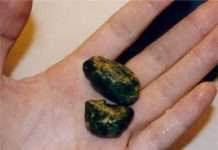Тригліцериди із середнім ланцюгом (MCT) різко зросли в популярності, особливо серед тих, хто дотримується кетогенної дієти, заявляючи про швидку втрату ваги та підвищення рівня енергії. Хоча вони часто продаються як концентровані добавки, MCT природним чином містяться в кількох продуктах харчування. Важливо розуміти, звідки беруться ці жири та їх ширший харчовий контекст.
Що таке SCT?
MCT – це тип насичених жирів, який відрізняється від довголанцюгових тригліцеридів (LCT), які зазвичай містяться в більшості харчових продуктів. Вони по-різному метаболізуються в організмі, потенційно забезпечуючи швидший доступ до енергії. Однак дослідження їх передбачуваної користі, особливо для схуднення, залишаються попередніми, оскільки багато досліджень проводилися на тваринах, а не на людях.
Дієтичні джерела МСТ
Ось розбивка продуктів, які містять MCT, із приблизною кількістю на порцію:
Кокосова олія
Кокосова олія є найбагатшим природним джерелом МСТ, особливо лауринової кислоти. Одна столова ложка містить приблизно 8-14 грамів МСТ. Хоча це потенційно здорове, важливо пам’ятати, що кокосова олія також має високий вміст насичених жирів і не містить значної кількості вітамінів, мінералів або клітковини.
Пальмоядрова олія
Пальмоядрова олія містить приблизно 7-8 грамів МСТ на столову ложку. Однак воно відрізняється від пальмової олії і рідше використовується в кулінарії. Його часто можна знайти в оброблених харчових продуктах, таких як рослинна олія, маргарин і жир.
Кокос (фрукти)
Кокосові вершки, виготовлені з кокосового м’яса, забезпечують приблизно 3-5 грамів MCT на ¼ склянки. Сам фрукт також має антиоксидантні та протизапальні властивості.
Рослиноїдний кремовий продукт
Травоїдні вершки містять невелику кількість МСТ — приблизно 0,7 грама на столову ложку. Однак надмірне споживання насичених жирів, навіть з вершкового масла, несе ризики для здоров’я.
Молочні продукти
Незбиране молоко, сир і йогурт також містять слідові кількості MCT. Однак його кількість значно нижча, ніж у кокосовій або пальмоядровій олії.
Міркування щодо здоров’я
Незважаючи на те, що MCT можуть принести деякі переваги, високий вміст насичених жирів викликає занепокоєння. Людям з високим рівнем холестерину, атеросклерозом або сімейною історією серцевих захворювань слід бути обережними. Надмірне споживання насичених жирів може погіршити прогресування бляшок і збільшити серцево-судинний ризик.
Контекст і баланс
Їжа, багата МСТ, має бути частиною збалансованої дієти, а не єдиною увагою. Вибирайте поживні продукти, такі як нежирні білки, цільні зерна, фрукти та овочі. Якщо ви додаєте кокосову або пальмоядрову олію, робіть це помірковано, пам’ятаючи про загальне споживання насичених жирів.
Висновок
MCT природним чином присутні в таких продуктах, як кокосова олія, пальмоядрова олія та молочні продукти, але їх передбачувана користь все ще вивчається. Зосередження на добре збалансованій дієті, а не гонитва за МСТ, є найефективнішим підходом до здоров’я та благополуччя. Проконсультуйтеся з лікарем або зареєстрованим дієтологом, перш ніж вносити істотні зміни у свій раціон.
